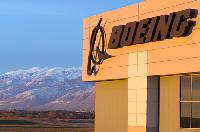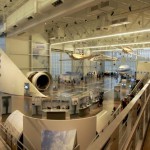The Boeing Company announced that its Fabrication manufacturing facility in Salt Lake City, Utah, has been awarded an ISO 14001 environmental management system certification from Det Norske Veritas, an accredited certification body of quality, environmental and safety management systems.
Salt Lake City – ISO 14001 confirms Boeing’s Salt Lake City facility has a certified system in place to monitor, manage and continuously improve its environmental management system.
Boeing’s Salt Lake City facility, which comprises a 267,000 square-foot site on 18 acres, is a center of excellence for complex machined parts. The site has a longstanding environmental management system and works with the local community to protect and improve the quality of the environment around the facility.
The system includes plant-wide efforts to reduce energy use, reduce the amount of material sent to landfills by improving the cardboard recycling program and implementing a program for plastics by purchasing a baler to compact the materials for recycling. In addition, the Salt Lake City facility is reducing air emissions and improving operational controls to eliminate spills into soil and water.
„We see this certification as an important milestone in our efforts to reduce environmental impacts and preserve precious resources. Working together, we will continue to make progress towards our goal, which ultimately will make this a much more environmentally efficient workplace for all of our employees and the surrounding community,“ Carbon said.
The international standards, first published in 1996 in Switzerland by the International Organization for Standardization, are designed to assist companies in developing, implementing and maintaining an effective environmental management system. Boeing Commercial Airplanes fabrication and assembly locations in Portland, Ore., and Everett, Wash., already are certified to the ISO 14001 standard.
The Boeing Company is committed to pioneering environmentally progressive technology and relentlessly reducing its environmental footprint. Since the introduction of the first Boeing jetliner, airplane emissions of carbon dioxide have been reduced by around 70 percent and the noise footprints have been reduced by approximately 90 percent. Boeing targets improving fuel efficiency and reducing carbon dioxide emissions of each new generation of commercial airplane by at least 15 percent compared to the airplanes they replace. Boeing has committed to extend ISO 14001 certification to all major manufacturing sites by the end of the year, and has set aggressive targets to improve by 25 percent solid waste recycling rates, energy efficiency and reduction of greenhouse gas emissions intensity at its major manufacturing facilities by 2012, with a comparable goal for hazardous waste reduction. For more information, visit the company’s 2008 environment report at boeing.com/environment.
Photo: Boeing





